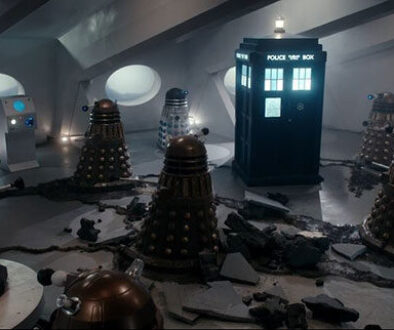The Witch’s Familiar Advance Review
Note: Doctor Who TV’s pre-air reviews aim to be as detail-free as we reasonably can while still offering a critique, but as everyone’s spoiler sensibilities are different, we advise you read on at your own discretion.

How on Earth do you follow up an episode that saw Clara and Missy exterminated, the TARDIS blown up, and Capaldi stranded on Skaro with his returning arch-enemy Davros? Not easily, is the answer.
The problem when you escalate things to such a degree in the first part of a story, no less the opener, is that you need a hell of a good reason to explain how things inevitably revert back in the concluding part, so the Doctor (at least) can go off adventuring again for the rest of the series at the conclusion. You could accuse Moffat of taking a couple of easy ways out, but at the same time this is the format of the show.
While we obviously cannot go into many specifics in the confines of a pre-air review, it’s safe to say that the resolution is largely satisfying, even if a couple of elements leave a little to be desired. It does at least provide an answer to most of the lingering questions from part one, and even questions you thought may have been glossed over.
In contrast to the first part of the story, which zipped around several locations at a pace, The Witch’s Familiar scales things down and restricts itself to just a few areas on Skaro. There are only a few characters as well. A few later action scenes aside, this allows for a more character-focused piece.
Once again we’re going to have to step around plot elements, but there isn’t a great deal of plot to speak of anyway. It is secondary with the focus instead shifting to the Doctor as he confronts his dying archenemy, Davros, for what may well be the final time.
Yes, the Doctor and Davros are at the centre of the episode. Their scenes aren’t slight either, going on for some time. We were sadly unable to mention him by name in the last review, but Julian Bleach is utterly superb as Davros. Here he gets to explore a radically different side of the maniacal leader, a move that may initially prove quite controversial.
Equally superb is Capaldi. This is an early showpiece episode for the Twelfth Doctor. With some big questions being asked we get to see Capaldi go through a whole gamut of emotions – and you really don’t want to make Capaldi angry. Davros, being a master manipulator though, knows exactly what buttons to push to make the Doctor tick, and even causes the Time Lord to question his compassionate nature.
Another highlight involves a returning character taking on a unique role in a very different part of Skaro. While this change initially makes for some great laughs, it escalates to one of the more tension-filled scenes of the episode.
As for the Daleks, while they look great, they are sadly reduced to coming across as pretty inept, which is a shame after their more intimidating presence last time around. But with so few characters around, it means that the Daleks don’t have a lot of targets, or just have to miss a lot. Additionally, it seems clear that Moffat wanted to add in some comic relief for the younger fans, but it does come at their expense, and even Davros early on.
It’s also a shame that the moral dilemma at the very heart of this story doesn’t really amount to much. But at least there’s a sense of some unfinished business. In particular it seems to set-up a larger arc for the year, and another potential future storyline that probably won’t occur for a while.
As with the opener, director Hettie Macdonald ensures the episode is visually lush. There’s a nice contrast with the more scenic and sunny Skaro landscapes (that overseas filming in Tenerife coming in handy) and its creepier underbelly. Special mention must also go to the Sixties era set design, which still holds up and makes those classic Daleks feel so at home.
So all in all, it’s a decent follow-up. The plot may be thin and some elements could have benefited from more depth, but it’s made up for with some sublime character moments.








